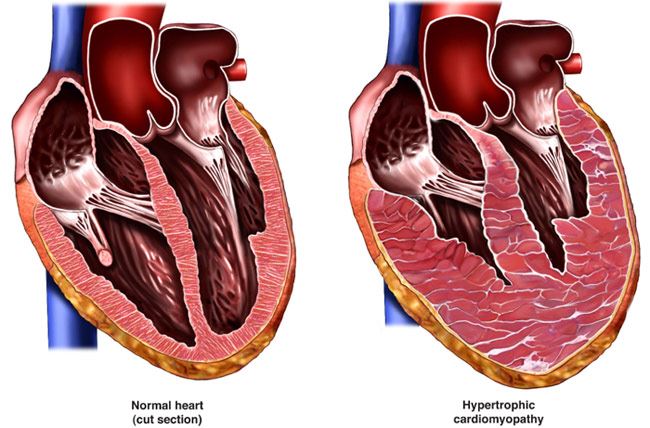Inherited Cardiovascular Disease
The word “inherited” means received. Genetic variations are inherited traits that are passed from parents to children. The parents’ genetic code is then copied into every cell of a child’s body during development.
Genes control every aspect of the cardiovascular system, from the strength of the blood vessels to the way cells in the heart communicate. A genetic variation (mutation) in a single gene can affect the likelihood of developing heart disease.
When a family member is diagnosed with heart disease or a heart disorder; other family members are encouraged to undergo screening for risk factors and early stage disease that may not yet produce symptoms.

Medical Illustration Copyright © 2019 Nucleus Medical Media, All rights reserved.
Types of Inherited Cardiovascular Disease
Following the pattern of a cardiac problem in your family can help your doctor predict the likelihood of you or other family members having the same condition. Some inherited conditions include:
- Cardiomyopathy
- Cardiac amyloidosis
- Heart arrhythmias
- Cardiac tumors
- Heart valve disease
- Familial thoracic aortic aneurysm syndrome.
- High cholesterol
- Pulmonary hypertension
- Autoimmune Disease: A condition in which your immune system mistakenly attacks your body (e.g. lupus, rheumatoid arthritis and scleroderma).
Causes of Inherited Cardiovascular Disease
Your body is made up of trillions of cells. Each cell has a nucleus, which contains information that makes you unique. This information is your genes. We each have between 20,000 and 25,000 different genes. Inherited heart conditions are caused by a fault (or mutation) in one or more of our genes. If one of your parents has a faulty gene, there’s a 50:50 chance you could inherit it. If you do, then there’s also a 50:50 chance you could pass it on to each of your children.
Symptoms of Inherited Cardiovascular Disease
With cardiovascular genetic diseases, there may be a number of signs and symptoms that families may not know about. If symptoms do appear, they may include:
- Chest pain
- Fatigue
- Heart palpitations
- Lightheadedness/fainting
- Shortness of breath
- Sudden cardiac death including sudden infant death syndrome.
Diagnosis of Inherited Cardiovascular Disease
Your doctor will conduct a physical examination, take a personal and family medical history, and ask when your symptoms occur. Your doctor will also administer a genetic test. This test will help understand current and future risk for developing cardiovascular disease. After that, your doctor may recommend diagnostic tests. Some of the diagnostic tests and procedures include:
- Cardiac catheterization
- Computed tomography (CT scan)
- Magnetic resonance imaging (MRI)
- Echocardiogram (ECHO)
- Electrocardiogram (EKG/ECG)
- Stress Test
Treatment of Inherited Cardiovascular Disease
There are several options that could help prevent and manage your current condition(s). Treatment options include:
Lifestyle Changes
- Avoid alcohol consumption.
- Avoid smoking.
- Eat a heart-healthy diet.
- Exercise under the directions of your doctor.
- If you're overweight, talk to your doctor about weight loss options.
- Manage stress.
- Make and keep appointments to see your doctor for routine check-ups and follow-up tests.
Medications for Cardiomyopathy and Arrhythmias
- Antiarrhythmic medications will help control your heart’s rhythm.
- Anticoagulants “blood-thinners” will help treat, prevent and reduce blood clots.
- Anti-Inflammatory medications will help reduce inflammation and relief pain.
- Beta blockers will help reduce your blood pressure.
- Calcium channel blockers will help relax and open up narrowed blood vessels, reduce heart rate and lower blood pressure.
- Diuretics “water pills” will help reduce the amount of fluid retention in your body.
- Gene-Modifying medications and protein stabilizers.
Medical and Surgical Procedures
- Cardiac ablation to treat arrhythmias
- Cardioversion
- Coronary artery bypass grafting (CABG)
- Heart transplantation
- Implantable cardioverter defibrillator (ICD)
- Pacemaker implantation
- Septal myectomy
- Ventricular assist device (VAD)
At RWJBarnabas Health, we are the destination for ensuring your heart health. If you believe — or you know — that you are at high risk for heart or vascular disease, don’t wait. Make an appointment with one of our expert New Jersey cardiovascular specialists now.
